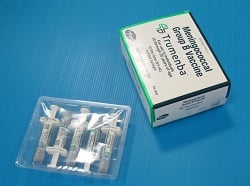 In a potential boost to uptake and adherence, Pfizer reported promising data this week on its meningitis B vaccine Trumenba administered along with Menactra and Adacel from Sanofi Pasteur.
In a potential boost to uptake and adherence, Pfizer reported promising data this week on its meningitis B vaccine Trumenba administered along with Menactra and Adacel from Sanofi Pasteur.
The data, presented at IDWeek 2015 in San Diego, demonstrate that immune responses following administration of Trumenba, Menactra and Adacel were noninferior to the responses seen with Menactra and Adacel alone or Trumenba alone. Menactra protects against meningococcal groups A, C, Y and W, while Adacel protects against tetanus, diphtheria and pertussis.
In a statement, Pfizer ($PFE) vaccines head Kathrin Jansen said "the convenience associated with coadministration of these recommended vaccines--including allowing for vaccination against 5 of the most common meningococcal serogroups--is an important factor in helping to protect as many adolescents and young adults as possible from vaccine-preventable diseases."
Trumenba won the FDA's blessing a year ago based on impressive midstage results during a time of national unease over the spread of meningitis B on college campuses. To follow that approval, the New York City-based pharma in August released data from two Phase III trials in which Trumenba met all primary immunogenicity endpoints. The vaccine is approved for individuals 10 through 25 years of age.
The newest data represent part of a "substantial global clinical development program" for Trumenba, Jansen said in the statement, but Pfizer's vaccine unit isn't just looking to expand there. The outfit has been on an expansion push lately, recently finalizing its acquisition of two older meningitis vaccines from GlaxoSmithKline ($GSK) for $130 million.
Beyond that purchase, it has looked to other M&A deals--buying Baxter's ($BAX) marketed vaccines portfolio and Switzerland's RedVax--plus internal development to beef up the division beyond its superstar pneumococcal disease blocker Prevenar 13, the world's best-selling vaccine with 2014 revenues of $4.3 billion. It also announced a new cancer vaccines effort in July, first targeting prostate cancer as a key indication.
- here's the release
- and the abstract